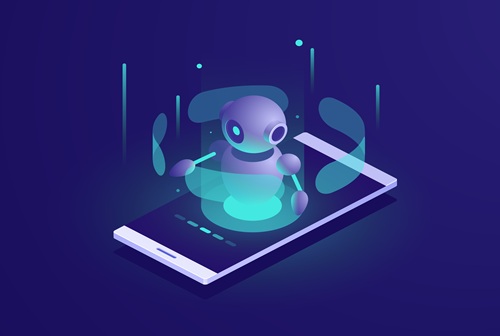Introduction to AI Chatbots
In a short span of time, Artificial Intelligence (AI) chatbots have changed how businesses communicate with customers, manage operations and improve end-user experience. Smart virtual assistants use artificial intelligence to converse like humans. They can respond to commands and requests using speech. This article will discuss about the capabilities, uses and future of an AI chatbot. It has the potential to change the landscape of communication.
1-What Are Artificial Intelligence Chatbots?
AI chatbots are software applications that employ Artificial Intelligence to enable automated and real-time interaction with users via text or voice interfaces. The difference between ordinary chatbot is that the Artificial Intelligence chatbot won’t rely on a script unlike ordinary chatbot.
Key Features of AI Chatbots:
| Feature | Description |
|---|---|
| Natural Language Understanding (NLU) | Enables chatbots to comprehend and interpret user queries accurately. |
| Machine Learning (ML) | Facilitates continuous learning and improvement from user interactions. |
| Contextual Awareness | Allows chatbots to maintain the context of a conversation for seamless communication. |
| Integration Capabilities | Easily integrates with CRM systems, social media platforms, and websites. |
2- Advantages of Using AI Chatbots
Enhanced Customer Support.
AI chatbots assist customers at any time or day with immediate responses to inquiries and resolve common problems. As a result, this enhances the client’s satisfaction rate.
Cost Efficiency.
Artificial Intelligence Chatbots help businesses lower operational costs by performing repetitive tasks and answering a large number of inquiries. They help to reduce the demand for large teams to support, which helps in better allocation.
Personalized User Experiences.
By analyzing data and tracking behavior, AI chatbots provide tailored recommendations and solutions that promote stronger ties between consumers and companies.
Scalability.
Since chatbots powered by AI can talk at the same time with an infinite number of people, they are the ideal solution for a growing or seasonal business.

3- Top Applications of AI Chatbots
| Industry | Application |
|---|---|
| E-Commerce | One can enhance the shopping experience through recommendations, order tracking, and more. |
| Healthcare | A multiplier for doctor visits, appointments, and medications. |
| Banking and Finance | Assisting with balance inquiries, fraud detection, and financial planning. |
| Education | Supporting students with course recommendations, administrative assistance, and prompt query resolution. |
| Travel and Hospitality | Helping users book tickets, manage itineraries, and access real-time updates. |
4- How AI Chatbots Work
Natural Language Processing (NLP).
NLP helps robots learning by analysing human behaviour and their dialogues. Accurate interpretation of user input covers processes like tokenization, sentiment analysis, and entity recognition.
Machine Learning Algorithms.
Artificial Intelligence chatbots learn from past experiences to improve their responses using machine-learning-powered algorithms. They use supervised and unsupervised learning to keep up with users needs.
Backend Integration.
AI chatbots connect to systems, databases, and APIs to access and process information. The user gets accurate feedback and answers in real time.
5- Challenges in AI Chatbot Implementation
Understanding Complex Queries.
Destructive advancements, AI chatbots can still get confused by unclear questions or overly particular queries. The result: Answering erroneously.
Data Privacy Concerns.
Guaranteeing the safety of user data is a big challenge. data security measures needed by businesses to save their sensitive data
High Initial Investment.
Artificial intelligence chatbots need great initial investments to computer technology and other components.
6-Future Trends in AI Chatbots
Voice-Activated Chatbots.
As smart speakers and voice assistants are getting more popular, voice-activated chatbots will be a norm soon. It’ll allow hands-free and intuitive communication.
Emotional Intelligence.
Future chatbot will understand you just like your friends and help you with their digital EQ. This will create more understanding and engaging situations.
Hyper-Personalization.
Advanced chatbots powered by AI will use big data to give a personalized experience. It will be according to the needs of the user.
AI Voice Recorder, PLAUD Note Voice Recorder
Conclusion
The advent of AI chatbots is changing the game of digital communication. Technology is a game-changing technology across industries by improving efficiency, enhancing user experiences, and generating cost savings. The use of AI chatbots in customer service is on the rise. But how are they changing the game for customers is still being monitored.
FAQs:
AI chatbots surely offer a lot of efficient services but they aren’t yet ready to replace human agents we need skilled agents for that.
According to a recent survey, more than forty-five percent of chatbots are developed using Python along with Javascript and R. These programming languages have clear libraries and frameworks.
Small businesses can adopt AI chatbots to improve customer engagement, automate repetitive work as well as get affordable 24/7 support to compete with bigger ones.
The main issues are privacy of data, how user data may be misused, and ensuring that users know whenever they are talking to a chatbot and not any human.
AI chatbots can help improve your SEO when they are deployed on your website. They can improve metrics like engagement and make sure visitors stay on your page longer while having a lower bounce rate. This is all because of the instant and relevant answers a chatbot can provide.



